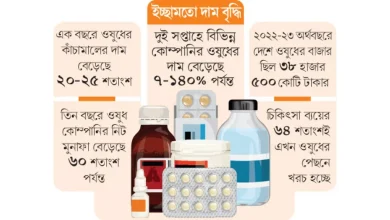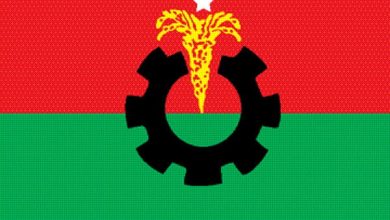Retail sales drop as blockade bites

Hawkers in New Market pass an afternoon devoid of customers amidst a blockade called by BNP and Jamaat-e-Islami. The photo was taken yesterday.
The nationwide blockade being observed by several political parties in Bangladesh is taking its toll on businesses as sales have plunged.
The transport blockade, set to enter its fifth phase on Wednesday, aims at forcing the current government to step down and pave the way for holding the next parliamentary election under a non-partisan interim government.
Blockaders have observed it for nine days since October 31 and set fire to hundreds of vehicles to press home their demand, creating panic among the common people.
A section of traders from wholesalers and retailers to vegetable sellers and restaurant owners in and outside of the capital said their sales have fallen as high as 50 percent, compounding losses for the businesses at a time when people have already tightened their belts owing to a lingering cost-of-living crisis.
Mehdi Hasan, a salesman of AM Enterprises, a wholesaler and retailer of bed sheets, curtains, mosquito nets, and blankets in the capital’s Gulistan area, says before the blockade, the shop used to have a daily turnover of Tk 2 lakh. Now, it has fallen to Tk 30,000.
“The sales are falling day by day. It is difficult to survive businesses in such a situation. We are going through a hard time.”
The sales of Bismillah Cloth Store, a retailer of shirts, pants, suits, blazers and panjabi in the same area, have seen its turnover halve on the day of the blockade, said Rifat Hossain, a salesperson.
“Usually around 30 customers come to the shop every day. Due to the blockade, it has come down to 15.”
Hasan Gazi, proprietor of New Khaja Stationery Shop in the capital’s Nilkhet, said before the blockade, about 100 wholesalers and retailers would visit the shop daily. Currently, it has fallen to a fourth.
Owing to a drop in sales, he has not placed any new orders with dealers for the past one week.
“Since the supply chain has been affected, we have been unable to supply goods outside Dhaka,” Gazi said.
Sales of cosmetics products have decreased as well.
Humayun Kabir, owner of Perfect Cosmetics Shop in New Market, said sales have halved.
“I think customers think twice before leaving their home on a day when the blockade is enforced.”
Abul Bashar, a seller of shirts, jeans, pants, T-shirts and trousers in the same area, reported that sales have declined by 30 percent compared to the pre-blockade period.
According to Tahmina Parveen Shyamoli, owner of Rochas Restaurant and Guest House in the northern district town of Bogura, turnover has decreased by 80 percent.
In order to cut expenses, she has introduced a system where a third of her 24 workers will always be on leave while the rest will run it in two shifts.
“I have had to do this since the income has plunged,” she told The Daily Star over the phone.
Kalachand Saha, owner of Rony Cloth Store in the New Market in Bogura, said before the blockade, he used to sell goods worth Tk 1 lakh a month.
“It will be difficult for me to sell products worth Tk 20,000 owing to the blockade.”
Humayun Kabir, the owner of Ruposi Bangla Clothing Store at the VIP Shopping Center in Chattogram’s Kazir Dewri area, blamed the 50 percent drop in sales on the blockade and the rising cost of living.
Abu Hanif Moral, a vegetable wholesaler in Khulna’s Sonadanga, said he suffered a loss of at least Tk 25,000 in the last 15 days.
“There were times when I had to sell vegetables at half of the purchased price.
For example, he bought cauliflowers last week at Tk 50 per kg. But he was forced to sell them at Tk 30 since the vegetables could not transported to the capital city.
“It is not possible to make a profit under the current circumstances,” Hanif said.
The blockade has not left brands unscathed as well.
Khalid Mahmood Khan, a co-founder of Kay Kraft, a retailer of fashion wear, accessories, home textiles, handicrafts and handloom-based products, observed that customer presence has dropped by more than 50 percent after the blockade began.
“It is normal in the current situation that customers will buy less.”
Several wholesalers and retailers such as Bashar said if the situation continues, it will be impossible for them to pay rent, and salaries to the employees and meet family expenses in the coming days.
Helal Uddin, president of the Bangladesh Shop Owners Association, the national platform of retailers, said overall sales have come down to 50 percent.
Because of higher inflation in the past one and a half years, consumers are buying less, hurting traders as well, he said.
“The blockade has made it more difficult for them.”
With the BNP calling for another 48-hour countrywide blockade from Wednesday after a pause for today, Helal expressed helplessness.
“We don’t know how to deal with the current crisis.”




